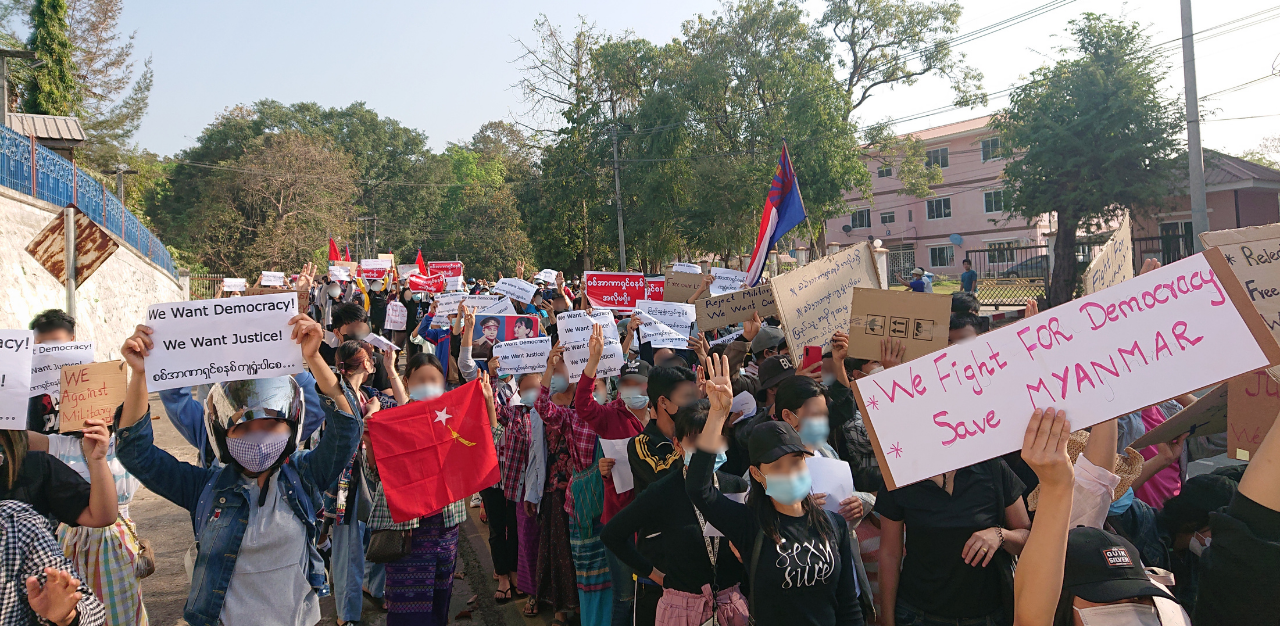In Myanmar, mass funerals are being held to mourn the deaths of protestors who had taken to the streets following the 1 February military coup. According to the United Nations, at least 149 people have been killed, including women and children. Hundreds more have disappeared, it said on Tuesday (March 16).
Thousands of miles away, Myanmar nationals living and working in Singapore speak to TheHomeGround to share how they have been dealing with the situation back home. It is estimated that the Myanmar community here numbers some 200,000 nationals, including domestic workers, students and professionals.
NOTE: Names have been changed to protect identities.
When news of the military coup made the headlines on the morning of 1 February, Isabelle, 32, a teacher in Singapore, was on her way to work.
“I remember not believing it, [I was] just in a state of disbelief,” she recalls. “At first, we were thinking, ‘Okay, maybe this is just a misunderstanding, [they will] talk it out and then it [will be] over.’”
But Isabelle’s hopes were dashed.
As news of elected State Counselor Aung San Suu Kyi and the leaders of the National League for Democracy (NLD) being detained made its rounds, Isabelle’s disbelief morphed into concern: “A lot of the NLD members of parliament are old, so we worry for their health, worry for a lot of things.”
On 1 February, Myanmar’s military seized power of the country, detaining Ms Suu Kyi and President Win Myint. It declared a year-long state of emergency, ending democratic civilian rule.
The military coup comes after Ms Suu Kyi led the NLD to a landslide victory in Myanmar’s general election in November 2020. The military had made allegations of electoral fraud, despite a lack of proof.
In response, citizens rose to hold peaceful demonstrations. In the beginning, the military responded by arresting protestors. Subsequently, they shut down the country’s internet, and blocked social media platforms.
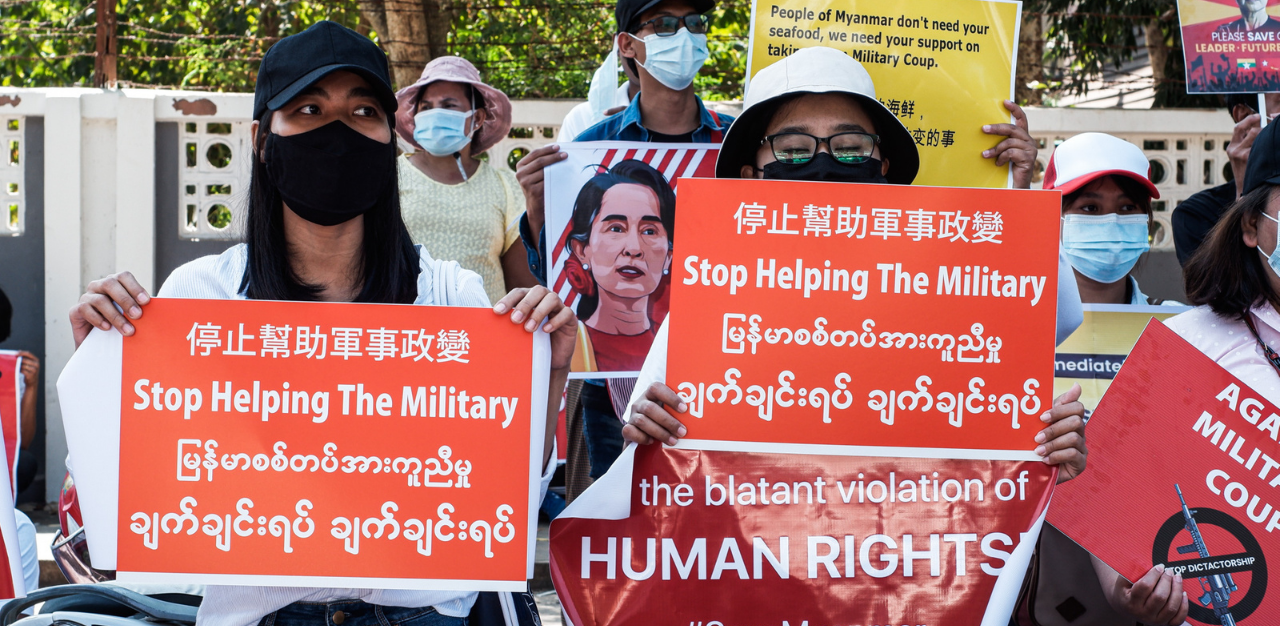
University student Phoo, 21, was outraged upon hearing the news.
“[I felt] anger because I had lived through the whole dictatorship period in Myanmar,” she shares. Phoo moved to Singapore in 2010, when she was 10 years old. At that time, Myanmar was under military rule. Seeing no future for Phoo then, her parents had made the decision to migrate.
“It feels like we’re living through it again, under dictatorship,” she adds. “My parents are very angry as well, because [they] lived through the ‘88 protests.”
For the younger generation of Myanmar individuals, being thrown under military rule again harks back to the horrifying stories they heard from their parents about the 1988 uprising.
Also referred to as the 8888 Uprising, 8 August 1988 was a watershed event in the country’s history, when Myanmar citizens joined in a nationwide strike led by students, marching on the streets of Yangon (formerly known as Rangoon) to call for democracy.
Phoo’s parents had experienced the uprising, and shared stories of the horrors that had occurred in the crackdown by the military.
“He [Father] told me about how [the military] hung the heads of the bodies they’ve hacked off in the supermarkets,” she recounts.
The demonstrations came to a violent end on 18 September, when the military retook power and declared martial law. Thousands were killed in the process.
A reminder of life under dictatorship
While the Myanmar individuals interviewed did not live through the harrowing experience, they remember how citizens had suffered prior to NLD’s rise to power in 2015. This was not a history they were keen to relive.
Thalim Lay, 32, arrived in Singapore in 2011 to work as a domestic worker to support her parents and three younger sisters. She comes from a family of rice farmers.
She claims that under military rule, her family was forced to give up a large portion of their rice harvest to the military. They were also required to pay a proportion of income to the military every year, leaving them with very little.
When the NLD came to power after the 2015 elections, Thalim’s family was finally able to save some money. Her burden was eased, and she was able to retain most of her income. She was looking forward to saving enough to eventually return home and start a business. But the military coup threw a wrench in her plans.
“Now, we [are] not happy. We don’t like the military power, we like democracy,” she stresses.
Isabelle, too, remembers the suffering of her people pre-democracy. She recounts a time when the military could, at any moment, ask to check their phones or enter their homes: “At gunpoint, if they ask you for your phone, you cannot not give [it to] them.”
“There is a complete disregard for the well-being of the people,” she despairs. “Healthcare, education, economy, personal lives, daily functioning, movement, all gone [if the military were to take over]. Nothing good can come out of it.”
Worry for their families back home
Living far from home has exacerbated their worries for family.
University student Min, 24, was at a loss when asked if her family in Myanmar was safe.
“This is a very hard thing to answer,” she says. “We don’t know when they will no longer be safe. They could be safe now, but every night, they get cut off from the outside world… My family has been moving around because there are times when their areas were quite bad.”
Phoo, whose family members had been actively taking part in the protests, has also been receiving alarming updates.
“I have cousins who were trapped [in the raids at Sanchaung]. They couldn’t go home until the morning, because if you go past them [the military], you get shot… As for my aunt, she was running away from bullets just the other day.”
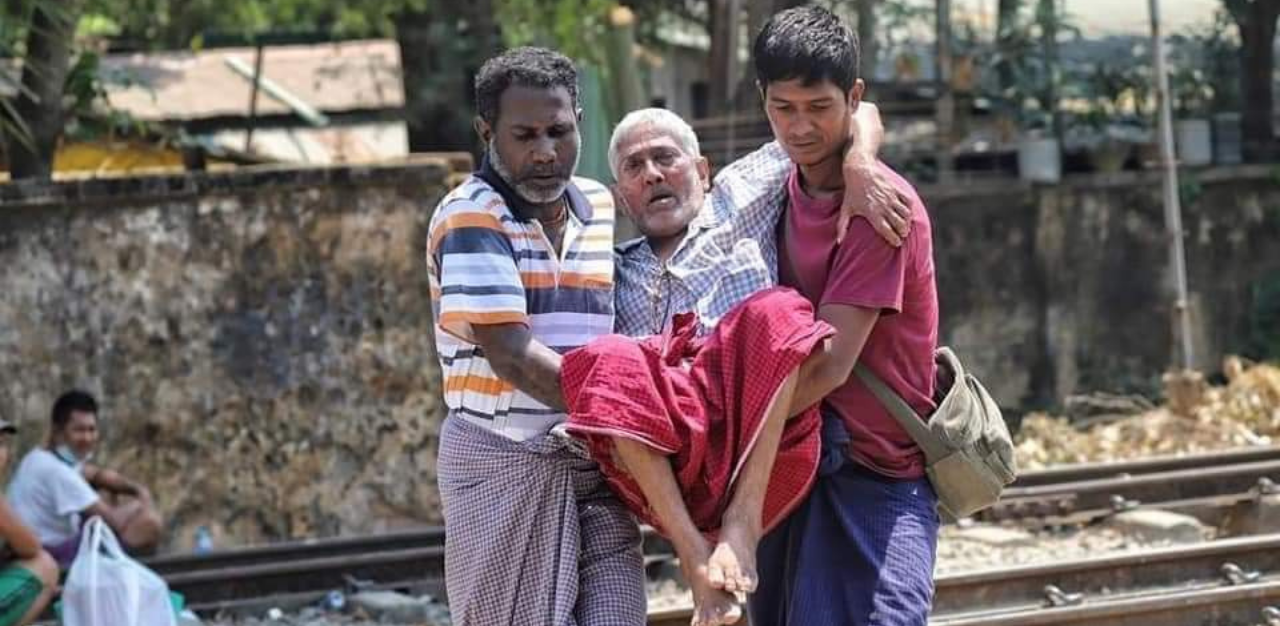
“I don’t think they’re safe,” Isabelle remarks. “If you look at the escalation of events, it’s not just people out on the streets that are affected or implicated. People in their homes are also being terrorised.”
She elaborates, “I had a close relative of mine who had these troops coming in, and they were shooting at the house… The whole family had to hide in the bathroom, because they were just shooting the front of the house.”
“No one is safe now,” she emphasises. And with this awareness comes an increasing sense of helplessness.
“There is such injustice and there’s nothing you can do,” Isabelle deplores. “Who do you go to, to report [acts of violence], when it’s your police that are killing everybody?”
A continuous fight for a better future
Even as the death toll increases, people continue to take to the streets in protest.
“The younger generation wants to fight. They want democracy,” says Thalim, who shares their determination.
“We can die. After we die, the next generation will be okay. We will get back democracy and we will be happy, and the country is nicer.”
Choking up, Isabelle shares how the hope of the Myanmar people has been crushed with the military coup.
“It’s like we took one step forward and 10 steps back. The country is completely in a state of destruction right now. Everywhere. We see the images [of Myanmar]. In my head, it’s like, ‘Is this even Myanmar? It doesn’t look like my home anymore.’”
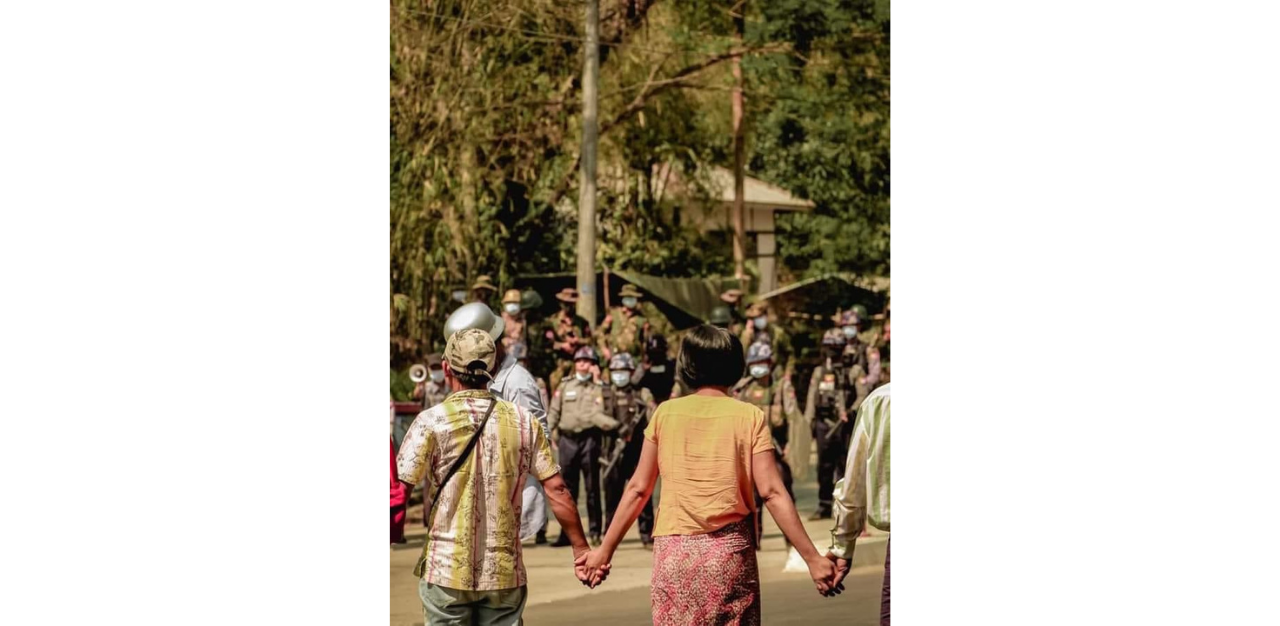
“The people don’t deserve this,” she adds. “They’ve such good hearts. Anyone who has ever been to Myanmar, that’s what they’ll tell you. The smiles and the warm welcome from everybody. That’s who they are. They don’t deserve this. The anguish grows, the helplessness is there, but we don’t let it settle in, because once that happens, we cannot win.”
She says of the protests: “Nobody wants to have to do this, but they know they have to. They don’t have a choice… They’re made to, because that’s the only way that we can move forward.”
“You die either way. If you go out, you may die. But if we don’t, the country is dead.”
A sense of guilt, helplessness, and despair
Being in Singapore, the four Myanmar individuals are aware of the laws regulating public assembly. They are happy to respect the law, but feel the guilt and helplessness of not being able to do more.
“You have this survivor’s guilt, right?” Phoo expresses. “I’m so privileged to be here, I’m safe, I’m in a country where the law is very much abided by. It’s very surreal going through this while trying to lead a double life. At night, I will cry myself to sleep, and in the morning, I have to pretend that everything’s okay and go to class.”
Similarly, Min experiences the discordance of leading a double life. Being unable to express her outright support has taken a mental toll. “You are expected to be okay, but it’s not okay, because it’s personal. But the thing is, everyone around you is fine, so you are kind of forced to be fine because nobody else is experiencing it.”
Even so, Min, Phoo, Isabelle and Thalim are doing what they can.
Despite not making much as a foreign domestic worker, Thalim donates to the cause and shares important news updates on the protests and crackdowns on social media.
She says, “If I can go back, I [will] also want to go. Now, [we] cannot fly, cannot do anything…Just pray, just share.”
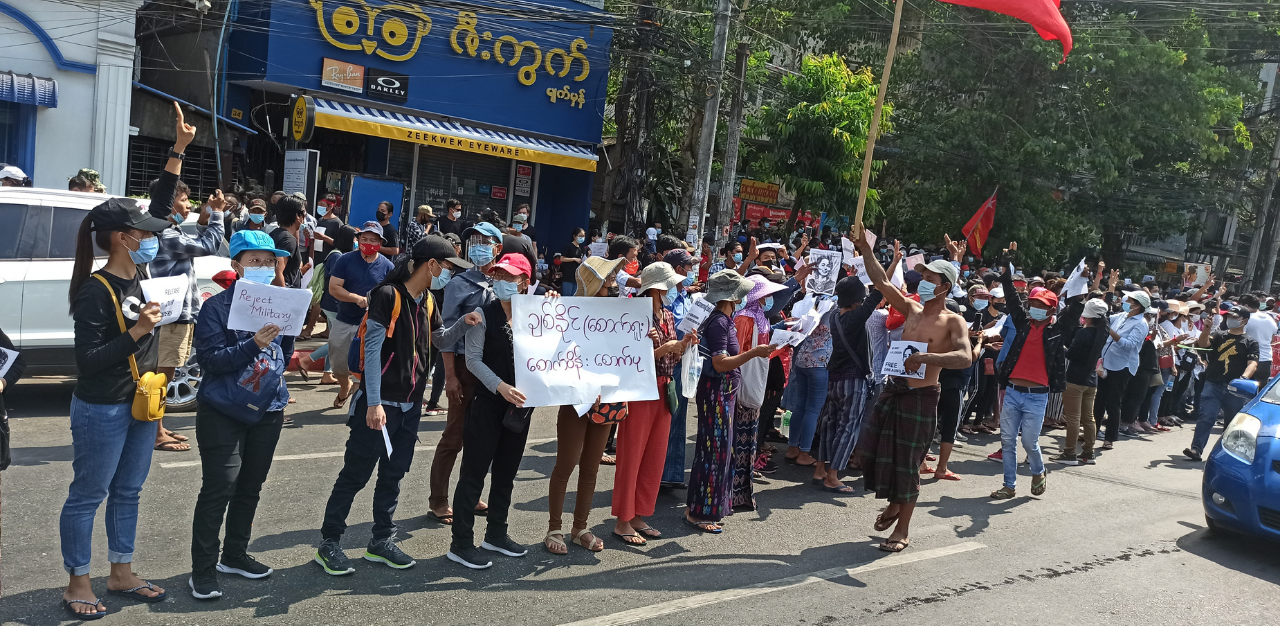
The other three are doing the same. Despite feeling overwhelmed by the continuous flow of often gruesome and horrific news, they feel obligated to continue sharing and speaking out, especially when their people are fighting on the frontlines and risking their lives for their country.
Phoo, for instance, took it upon herself to compile a list of resources for individuals to refer to if they wish to learn about what is happening in Myanmar, and what they can do to help.
What you can do
Isabelle makes a simple plea: “Please acknowledge what is happening. We’re not politicians, but [even] the comments on social media is a source of hope, revival, and energy for those fighting for their freedom.”
In particular, Min requests that employers of domestic workers from Myanmar can support them during this time.
“Most of them [domestic workers] don’t have an outlet, or they don’t have emotional support because they are here alone without their families,” she shares. “If you have a Burmese friend, then it doesn’t really hurt to reach out to them. Make sure that they are okay, or just listen to what they have to say. If you see a social media post that your friend has shared, it could be really helpful to just share it.”
Within Phoo’s compilation of resources, she has also included information relevant to Singapore, such as a letter template to appeal to Members of Parliament regarding Singapore’s position on the coup, and a resource list for Singaporeans who wish to learn more and help.
Remaining sanguine, Phoo says, “I know that we will win this fight. Even though the situation looks really bad right now, we will get through this, and we will see a better future.”
Join the conversations on THG’s Facebook and Instagram, and get the latest updates via Telegram.
